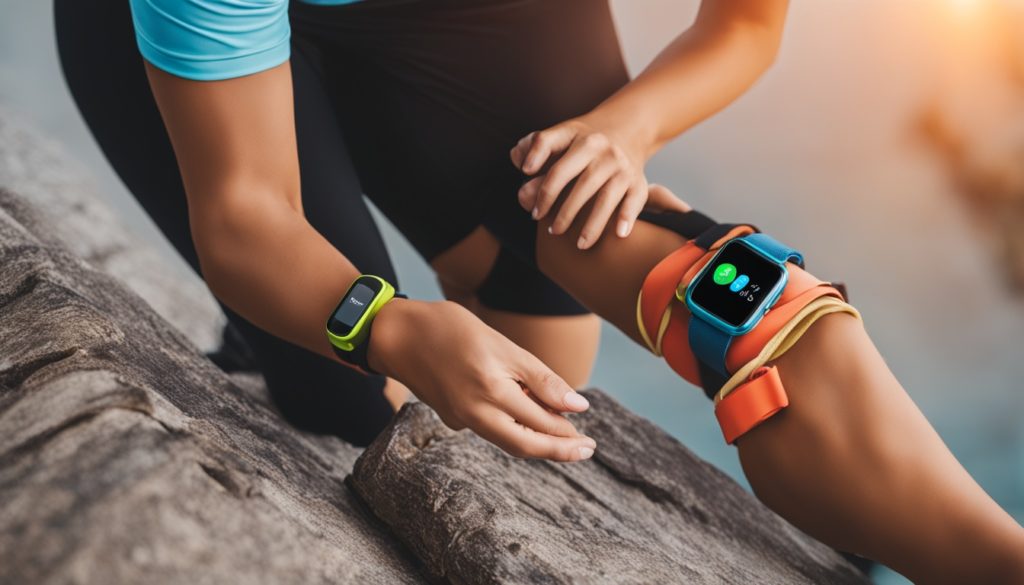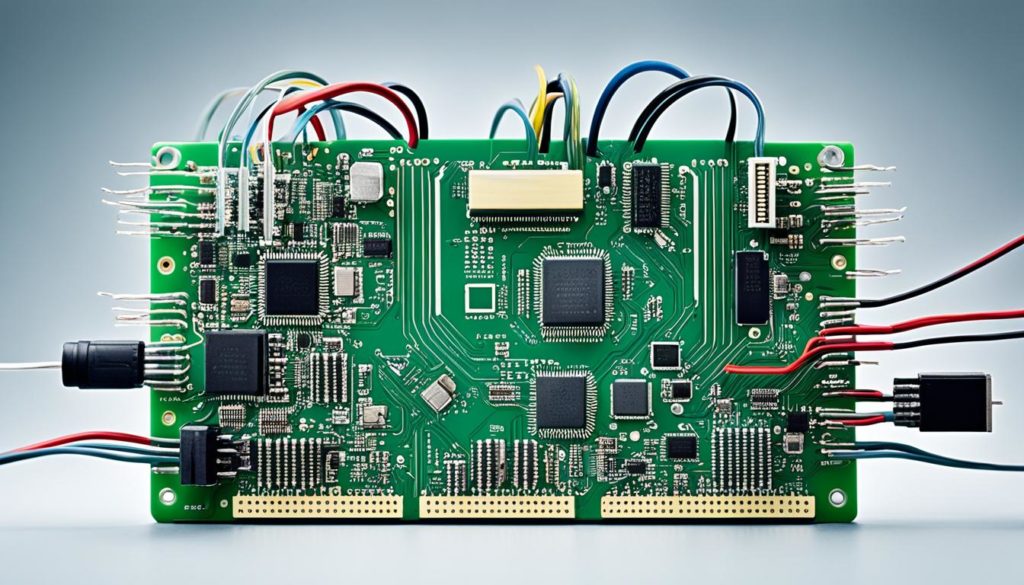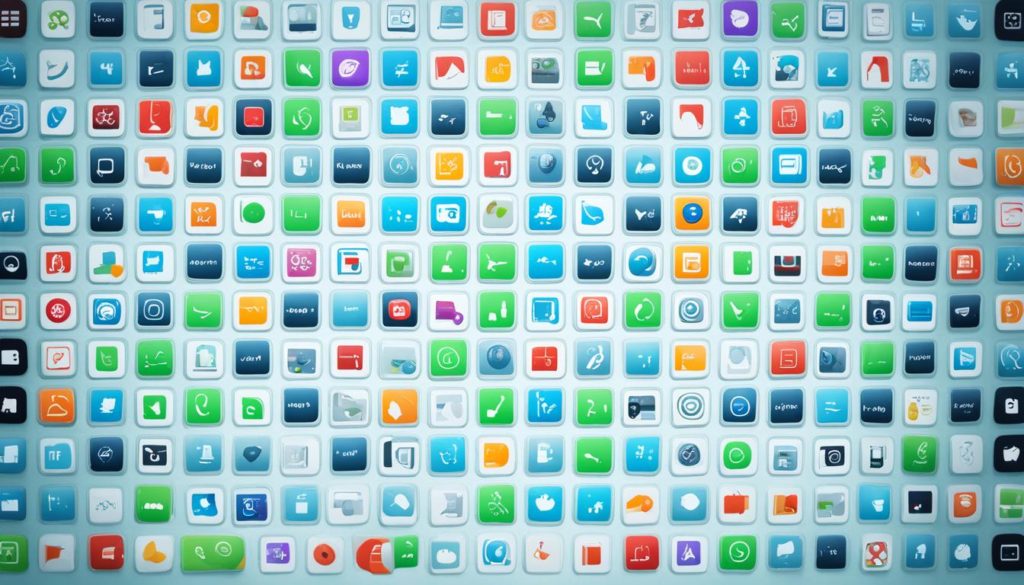
Did you know wearable healthcare devices made $20 billion in 2019? They started as simple trackers but have become vital health monitors. Devices like the Apple Watch, Fitbit, and advanced sweat sensors help athletes stay hydrated. Wearable technology is changing how we look after our health.
Wearable technology does more than track fitness. It’s crucial in patient care, with devices like temporary intravascular systems supporting cancer treatment. Real-time data from these devices help us manage health and empower patients.
Studies show wearable devices give users more control over their health. Research found that 78% see a positive impact on health management. And 65% of people with chronic diseases manage their conditions better with these tools.
These devices also promote preventive health measures and lifestyle changes. They let us monitor our health closely and spot issues early. This proactive stance can make healthcare systems more efficient, reducing pressure points.
Key Takeaways
- Wearable healthcare devices have evolved from fitness trackers to comprehensive health monitors.
- They play a critical role in patient empowerment and improved health management.
- Devices like the Apple Watch and Fitbit offer real-time health insights.
- Advanced health technology can assist in specialized medical care, such as cancer treatment.
- Patient engagement levels have increased with the adoption of wearable health technology.
Advanced health tracking devices offer real-time monitoring and better chronic disease management. Stay tuned for more on how wearable technology is transforming healthcare.
Learn more about the in vivo enrichment of circulating tumor or explore the pros and cons of wearable devices in healthcare.
Find out how wearable healthcare devices are helping healthcare providers worldwide.
The Rise of Wearable Healthcare Devices
Technology keeps getting better, and so do our ways to keep an eye on our health. Smart health wearables have jumped from simple step counters to all-around health monitors. These advanced wearable medical devices are changing our approach to healthcare. They give us immediate info on many health aspects. This is leading to new ways to prevent health problems.
From Fitness Trackers to Comprehensive Health Monitors
No longer are fitness trackers just for counting steps. Now, smartwatches, like the Apple Watch Series 6, come with high-tech sensors. They can catch early signs of health issues. These wearable medical devices track heart rate, blood oxygen, and even do ECGs. They encourage us to look after our health before problems start.
Increased Adoption in Medical Communities
Doctors and healthcare workers are starting to use these connected health gadgets more. They’re weaving them into how they look after patients. This shows they trust these comprehensive health monitors more than ever. Quick access to health data helps doctors make better choices. It also lets people have more say in their healthcare path.
Benefits of Digital Health Wearables
Digital health wearables are changing the way we manage health. They make real-time health monitoring better. They also help manage chronic diseases better. These devices lead to better health and personalized care.
Real-Time Health Monitoring
Digital health wearables are great for checking health stats as they happen. They keep an eye on your heart rate, blood sugar, and how well you breathe. A 2017 study by Aliverti A. showed how these devices change the way we take care of people with respiratory diseases. Spotting health issues early can help treat them faster.
Improving Chronic Disease Management
These gadgets are super helpful for managing long-term health problems. They track health data for diseases like diabetes and heart disease. This makes it easier for patients and doctors to handle these diseases. For example, a 2019 study by Perez MV. et al. showed how a smartwatch can spot heart problems. Using these devices can also cut down on hospital visits, saving time and money.
Encouraging Proactive Health Management
Digital wearables motivate people to take charge of their health. By always watching their health, people can change their habits to stay healthy. A 2019 study by Shin G. highlighted how wearable trackers encourage a healthier lifestyle. This leads to care that’s more tailored to what the patient needs.
During the COVID-19 pandemic, wearables proved to be very important. A 2021 review by Channa A. et al. showed their impact. Research by Sim I. in 2019 also supported the importance of mobile devices in health. They play a big role in how we improve health care.
The table below shows what’s good and what’s tough about digital health wearables:
| Advantages | Challenges |
|---|---|
| Real-time health monitoring | High costs for medical organizations |
| Improved chronic disease management | Concerns about data reliability and validity |
| Encouraging proactive health management | Privacy and security issues of medical data |
| Cost savings and efficiency improvements | System interoperability and connectivity issues |
| Empowering patients for personalized care | Potential data overload causing stress |
Wearable Healthcare Devices in Chronic Disease Management
People with chronic diseases like diabetes and heart disease face many challenges. Wearable healthcare devices help a lot by allowing for ongoing monitoring. They collect data steadily, making it easier to handle these conditions.
Managing Diabetes and Heart Disease
For diabetes, wearable devices offer real-time checks on glucose. This feature helps individuals adjust their insulin as needed. For heart diseases, these gadgets spot irregular heartbeats early on. Such early warnings can lower the risk tied to these long-term health issues.
Continuous Monitoring for Hypertension
Wearables also shine in managing high blood pressure. They keep a continuous eye on blood pressure. This enables early action against high blood pressure spikes, leading to better control. Consistent tracking helps in preventing severe problems.
The Role of Smart Health Wearables in Patient Empowerment
Smart health wearables heavily influence how we manage our health today. They give us up-to-date health data and personal insights. This technology helps people play an active role in their health management.
Promoting Patient Engagement
Health wearables are key in engaging patients with their health. They monitor vital signs like heart rate and activity levels. For example, devices like heart rate monitors help athletes and those with heart issues stay healthy. Our guide on wearable technology in healthcare shows that real-time data improves health outcomes.
Customizable Health Insights
The top feature of health wearables is they offer personalized health info. This information helps users make better health choices. For instance, wearable blood pressure monitors simplify home health monitoring. The demand for these devices will reach 148 billion USD by 2029, as market projections show.
Improved Communication with Healthcare Providers
Health wearables also better communication between patients and doctors. They share health data easily, helping doctors create precise treatment plans. For example, watches like the Apple Watch provide crucial health data.
Conclusion
Wearable healthcare devices are changing how we look after our health. They turn us from passive patients into active health advocates. These gadgets track our health in real time, help manage chronic issues, and give us useful advice.
The wearable device market is expected to grow big, reaching over US$380.5 billion by 2028. Also, more than 20% of Americans might use these gadgets soon.
These devices are becoming a big part of healthcare, helping patients and doctors work better together. Companies like Omron Healthcare and Withings make devices that monitor heart rates and blood pressure. Plus, gadgets like AliveCor’s KardiaMobile 6L are approved by the FDA to spot early signs of health issues.
As technology improves, wearable health devices could become key for our health and the healthcare system. There are conversations to be had about the privacy and security of these devices. This is especially true after Covid-19 made these gadgets essential for tracking health. The future of wearables in healthcare looks promising. It could lead to a better and more connected health experience for everyone. The advantages of health wearables are clear, and their potential is huge.
FAQ
What are wearable healthcare devices?
Wearable healthcare devices are gadgets worn on the body. They track health metrics. Examples include fitness trackers, the Apple Watch, and biomedical sensors.
How do health tracking devices benefit us?
Devices like Fitbit track our physical activity, heart rate, and sleep. They provide data that helps us make healthy choices.
What advancements have been made in wearable health technology?
Wearable technology now monitors fitness and vital signs like heart rate and blood glucose. New devices include wearable sweat-sensors and intravascular devices for medical use.
What makes smart health wearables different from traditional fitness trackers?
Smart wearables, like the Apple Watch Series 6, offer more than fitness tracking. They can spot early signs of medical conditions, helping in preventative health.
How are wearable medical devices integrated into patient care?
Wearable devices provide continuous health tracking, allowing remote monitoring by healthcare providers. This helps in proactive management and timely interventions.
What are the benefits of digital health wearables?
Digital health wearables track health in real-time and manage chronic diseases. They empower patients with information and improve communication with doctors.
How do remote monitoring devices aid in managing chronic diseases?
Remote devices provide continuous data on health metrics, like blood glucose and heart rate. This data helps in timely treatments and personalized care plans.
Q: What role do connected health devices play in encouraging proactive health management?
Connected devices offer insights into health metrics, encouraging lifestyle changes and early doctor visits. They keep users informed and engaged with their health.
How do wearable healthcare devices assist in managing diabetes and heart disease?
These devices monitor blood glucose and heart rate continuously. This supports better control of diabetes and heart disease through timely treatment adjustments.
How do digital health wearables contribute to hypertension management?
Digital wearables continuously track blood pressure, providing insights into trends. This allows for better hypertension management through timely interventions.
How do wearable health technologies promote patient empowerment?
Wearable technologies give personalized health insights and enhance patient engagement. Their simple interfaces and custom reports make it easier for patients to manage their health.
What are the benefits of customizable health insights provided by smart health wearables?
Smart wearables let users customize health data tracking. This makes monitoring more meaningful and supports personalized health goals and treatments.
How do these devices improve communication with healthcare providers?
Wearable devices enable the easy sharing of health data with doctors. This leads to better discussions, collaborative care, and improved health outcomes.
Future App Studios is an award-winning software development & outsourcing company. Our team of experts is ready to craft the solution your company needs.










